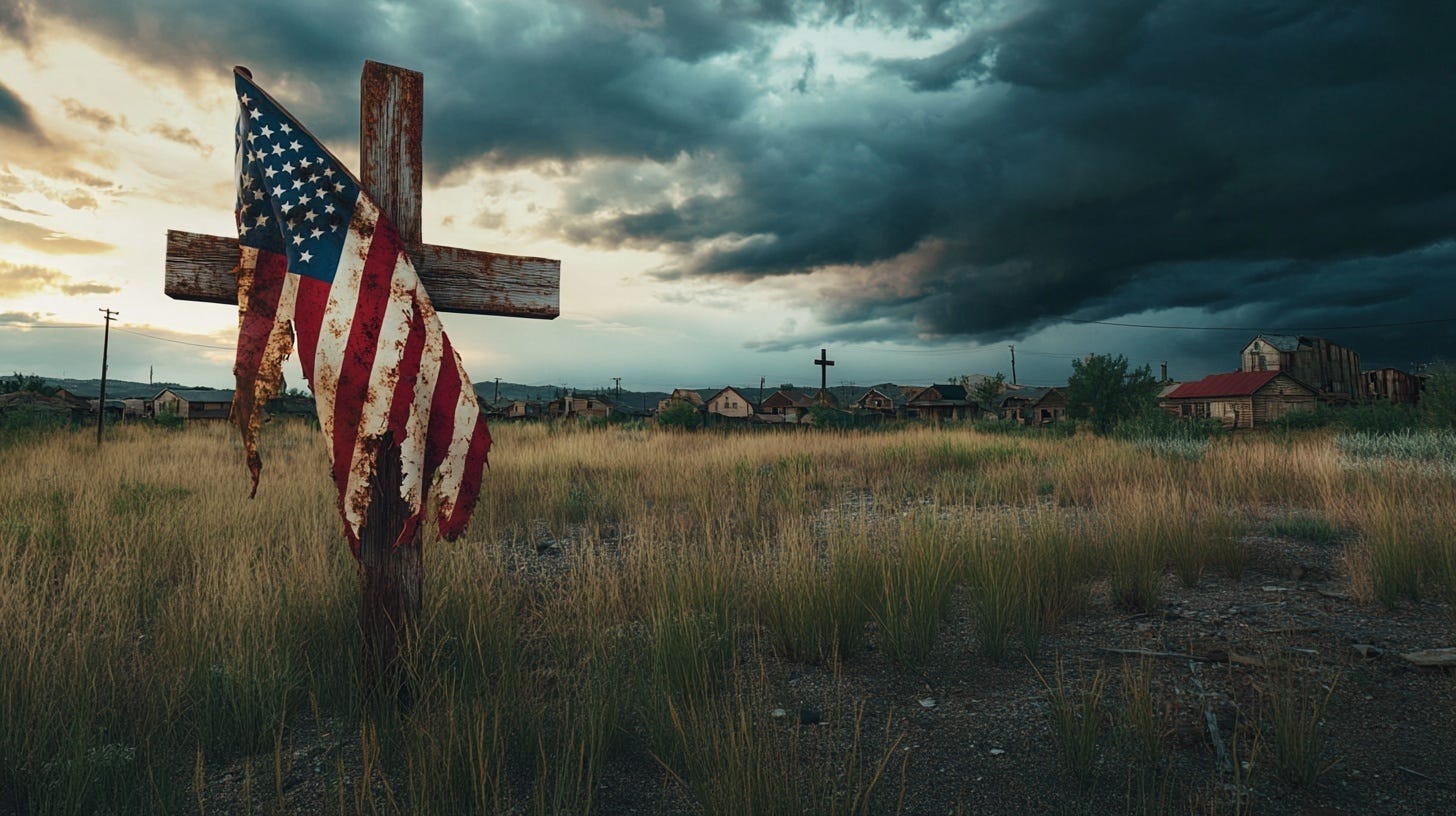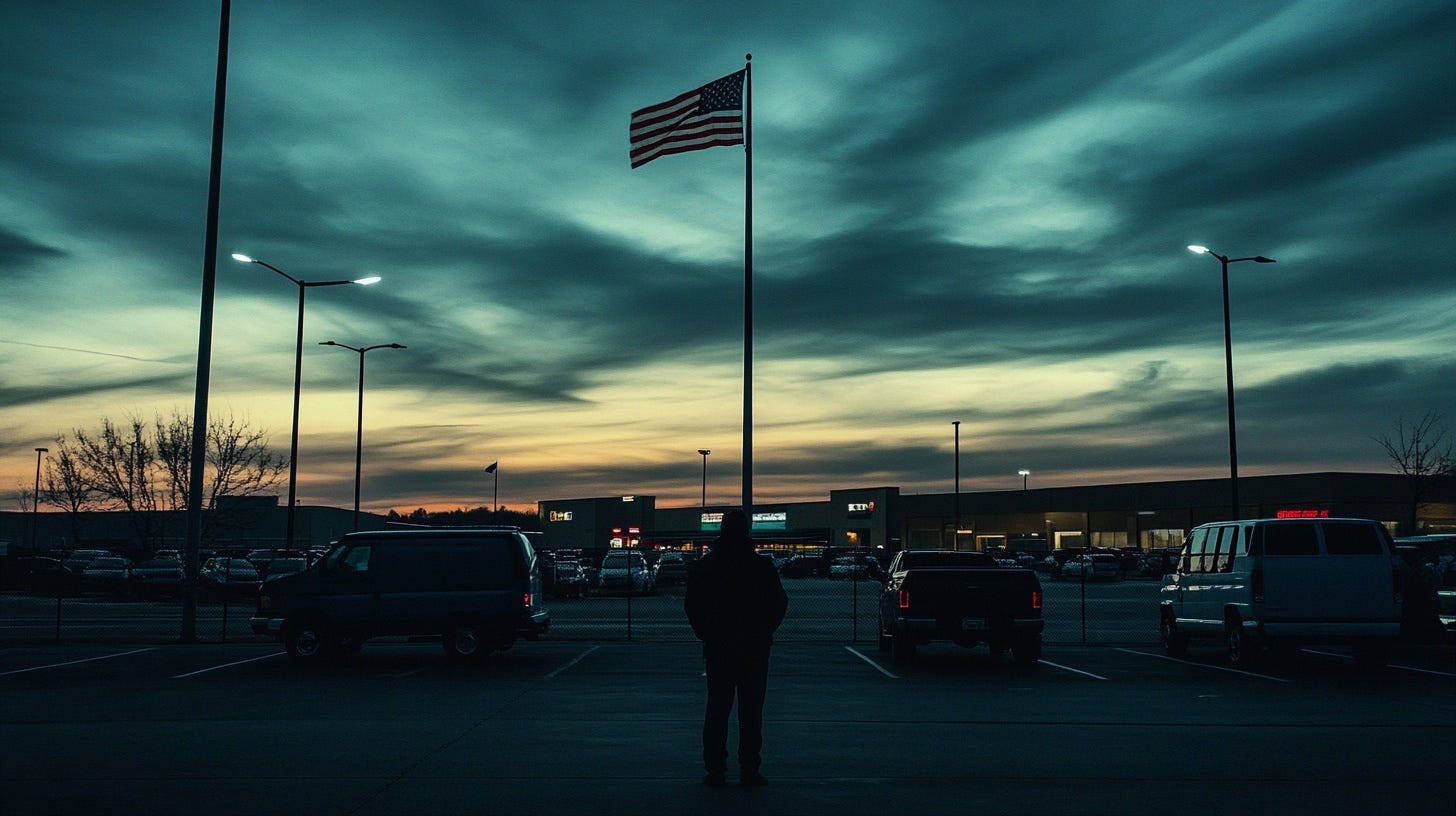Now in these dread latter days of the old violent beloved U.S.A. and of the Christ-forgetting Christ-haunted death-dealing Western world I came to myself in a grove of young pines and the question came to me: has it happened at last?
Walker Percy, Love in the Ruins
I couldn't bring myself to write this on July 4th. I tried. I sat down and opened the laptop. The words wouldn’t come. Or rather, all of the words came in a torrent, but with no sense to them. The weight of it, the cascade of thoughts that have been accumulating for months—all of it felt too much to face directly. But watching the flag-wrapped celebrations, the determined cheerfulness, the grotesque parade. The way we keep performing normalcy while everything shifts beneath us made it clear where to begin.
There are no halcyon days to resurrect. There never were.
Something has taken hold in the American imagination: a hunger for a past that exists primarily in our collective unconscious. Not mere nostalgia—something more desperate. A belief that there was a time when things made sense, when people knew their place, when the complexities of the present hadn't yet arrived to complicate the clear moral lines of yesterday.
I understand the appeal. The gleaming small towns, the moral clarity, the white-picket ease of it all. The good factory jobs that created a middle class. Generations that always do better than the previous ones. But here's what troubles me: none of it existed as advertised. Not for most of us. The America we're promised we can return to is a carefully curated fiction, cleansed of its cruelties, its exclusions, its fundamental contradictions.
Yet this mythology has become a kind of civic religion. And like all religions built on false premises, it licenses cruelty in service of an impossible resurrection.
I've never been particularly interested in writing about Donald Trump as a phenomenon. He's a type I recognize—the petty vainglories, the grudge-holding, the way he mistakes cruelty for strength. He reminds me of men I've known, right down to the disdain disguised as charisma.
What I don't recognize is my fellow citizens' willingness to be taken in by promises of restored glory. The credulity of otherwise sensible people who look at him and see salvation rather than what he so plainly is: a man who tells people what they want to hear about their failures being someone else's fault.
This is how demagogues work. They don't awaken the hunger. They recognize the ache beneath our fear and feed it meat.
We've grown fluent in euphemism. "Law and order" means silencing dissent. "Free speech" means impunity for your team. "Equal justice"—but as Orwell understood, some Americans are now more equal than others.
Speech gets chilled not through dramatic crackdowns but through small accommodations. A professor reconsiders an assignment. A journalist softens a story to maintain access. Justices issue unexplained shadow docket rulings to avoid confronting substantive lawlessness. We've created a climate where truth becomes negotiable, where courage becomes a luxury few can afford.
After the passage of the reconciliation bill, we now fund ICE at levels higher than the entire budget of the Israeli military. Let that settle for a moment. We’ve allocated $40 billion to build a detention infrastructure designed to disappear people, without allocating a cent for additional immigration judges. That imbalance exposes the entire enterprise for what it is. We've built an internal police force, funded it lavishly, and turned it loose on people whose primary transgression was believing what we've always claimed to offer.1
The raids happen in parking lots now. Masked men, no warrants, children separated from parents. Immigration judges stripped of discretion, when these men and women get a hearing at all. The machinery of an internal security apparatus, growing bolder and better funded with each appropriation, defended always in the name of preserving something we imagine we once possessed.
This isn't happening to us. This is us. This is what we've decided to become.
This is how republics die—not with jackboots but with shrugs, not through revolution but through the quiet acceptance that some things are too dangerous to defend.2
My ancestor Josiah Bartlett signed the Declaration of Independence. I've always carried some pride in that, though I'm not sure why. I inherited the name, not the courage.
But I've been thinking about the document he actually signed. Not the sanitized version we recite between hot dogs and fireworks, but the original document: a list of grievances against a king who had placed himself above the law. A king who claimed immunity from prosecution, who demanded personal loyalty over legal process, who deployed the machinery of state against his critics.
The parallels aren't subtle. We're watching the return of precisely what the Founders thought they'd defeated.
J.D. Vance has begun saying the quiet part aloud: that the Declaration's promise—"all men are created equal"—is dangerous. Too inclusive. Too generous. In its place, he offers something older and more poisonous: blood and soil, ancestry over ideals, the nation as inheritance rather than aspiration. In his telling, Confederates, historic and modern, have a stronger claim to American identity than any immigrant.
This isn't conservatism. Not any kind of conservatism worthy of that name. This is the rejection of the American project as we've understood it, replaced with something that has no use for the Declaration except as branding. It treats equality as a threat and grievance as justification for power.
We are living through the exposure of American ideals, not their corruption. The gap between what we said we were and what we've always been is finally becoming too wide to paper over with ceremony and myth. Over and over again, we hear public figures saying, “This isn’t who we are.”
Except this is manifestly who we are.
Perhaps this was inevitable. Perhaps nations, like people, eventually run up against the contradictions they've spent generations avoiding. Perhaps what we're witnessing isn't the destruction of America but the revelation of what it always was beneath the rhetoric.
Yet there are still people pushing against the current. Teachers who refuse to stop teaching, journalists who refuse to stop reporting the damned truth, judges who refuse to bend. They're not doing it because they believe they'll win. They're doing it because they can't bear to live in a world where they didn't try.
I don't know how this ends because stories like this don't really end—they just become other stories. But I know we have a choice to make, even if the options aren't what we'd prefer.
We can continue performing the fiction that everything is normal, that this is just politics as usual, that the institutions will hold because they always have. Or we can acknowledge what we're watching: the quiet dismantling of the architecture that made democratic life possible.
The question isn't whether America was ever great. The question is whether we dare to make it so, knowing now what we always should have known: that it was never a finished thing, never a completed project, always something we had to choose to create, again and again, in each moment we're faced with the choice between comfort and conscience.
The luxury of pretending otherwise is over. A “more perfect union” was always going to require ever more work. The horizon recedes as we approach it.
Yes, some immigrants—legal and undocumented—have committed violent crimes. No serious person opposes their deportation, provided due process is afforded. But that’s not what this is about. That’s the cover story. The real mission is something else entirely.
Yesterday, it occurred to me that I never heard that the military left Los Angeles, so I checked on it. There are more US troops in LA right now than there were in Afghanistan for the year before withdrawal.






This is a tangent (of course it is) but the fallacy of "we" can be very painful. Thinking "we all" in a particular subset have the same code is a tragically flawed assumption. And I personally fall for it over and over in personal settings (whereas I am very cynical in professional settings).
Nicely written essay Owen. Footnote #2 is incredibly disturbing. I live in LA and did read that 2000 out of 4000 national guard troops were pulled last week. That is still 2000 troops too many here.